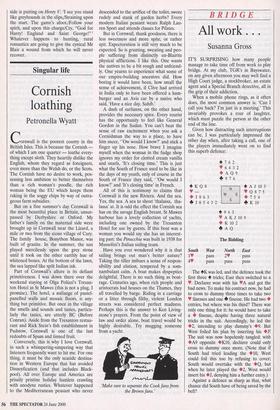BRIDGE
All work . .
Susanna Gross
IT'S SURPRISING how many people manage to take time off from work to play bridge. At my club, TGR's in Bayswater, on any given afternoon you may well find a High Court judge, a stockbroker, an estate agent and a Special Branch detective, all in the grip of their addiction.
When a mobile phone rings, as it often does, the most common answer is: 'Can I call you back? I'm just in a meeting.' This invariably provokes a roar of laughter, which must puzzle the person at the other end of the line.
Given how distracting such interruptions can be, I was particularly impressed the other day when, after taking a call, one of the players immediately went on to find this superb defence:
4 K Q 8 ♦ J 8 6 3
+ I 8 5 4 3 2 South West 1V pass 4, pass The 4K was led, and the defence took the first three 4 tricks; East then switched to a V. Declarer won with his VA and got the bad news. To make his contract now, he had to cross to dummy three times to take two V finesses and one finesse. He had two • entries, but where was his third? There was only one thing for it: he would have to take a ♦ finesse, despite having three natural tricks in the suit. Accordingly, he led the *2, intending to play dummy's *9. But West foiled his plan by inserting his •J! The suit was now hopelessly tangled: with *A9 opposite ♦K10, declarer could only cross to dummy once more. (Note that if South had tried leading the •10, West could foil this too by refusing to cover; South would overtake with the ♦o, but when he later played the ♦2, West would insert his •J, denying him a further entry.) Against a defence as sharp as that, what chance did South have of being saved by the bell?
4 9 4 3 ✓ A K J 10 9 ♦ K 10 2
• A Q The Bidding 4 7 6 2
✓ 6 4 3 2 ♦ A Q 9 • 9 7 6
N W E S
North East 2V pass pass pass 4 A J 10 5
• Q 8 7 5
♦ 7 5 4 • K 10


































































 Previous page
Previous page